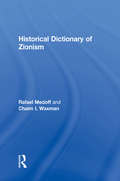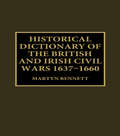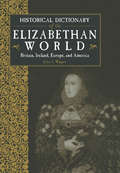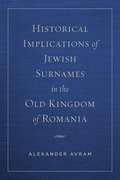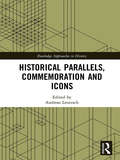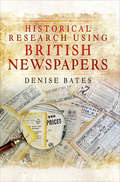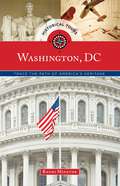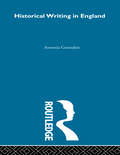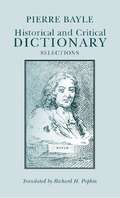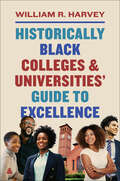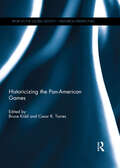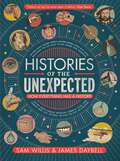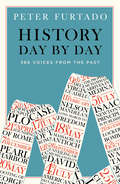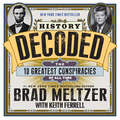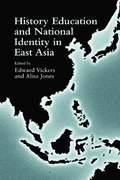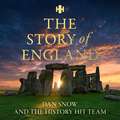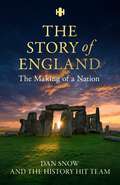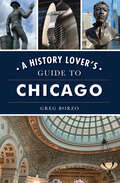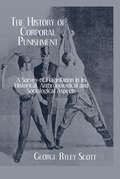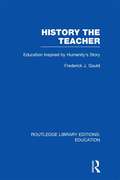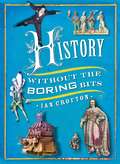- Table View
- List View
Historical Dictionary of Zionism (Religions, Philosophies, And Movements Ser. #No. 31)
by Chaim I. Waxman Rafael MedoffThe Jewish attachment to Zion is many centuries old. Although the modern Zionist movement was organized only a little more than a century ago, the roots of the Zionist idea reach back almost 4,000 years, to the day that the biblical patriarch Abraham left his home in Ur of the Chaldees to settle in the promised land The Historical Dictionary of Zionism is an excellent source of information on Zionism, its founders and leaders, its various strands and organizations, major events in its struggle, and its present status. By showing the movement's strengths and weaknesses, it also acts as a corrective to overly idealistic comments by its supporters and the wilder claims of its opponents. A much more realistic understanding is offered in the Introduction, which presents and explains the movement; the Chronology, which shows its historic progression; the Dictionary, which includes numerous entries on crucial persons, organizations and events; and the Bibliography, which points the way to further reading.
Historical Dictionary of the British and Irish Civil Wars, 1637-1660 (Historical Dictionaries Of War, Revolution, And Civil Unrest Ser. #No. 14)
by Martyn BennettDuring the 17th century the British Isles were trapped in a 23-year-long state of turmoil through civil war, continued rebellion, and revolutions. King Charles I wanted to instill a new uniform religious policy throughout the British Isles, and this caused a massive uproar over the King's policies toward the diverse people in his kingdom, the English, Irish, Scottish, and Welsh. Through a concise historical chronology and comprehensive overview, users of the Historical Dictionary of the British and Irish Civil Wars will find a very insightful explanation of the people, places, and events that indelibly shaped the United Kingdom's 17th-century history. The cross-listed dictionary entries offer a complete explanation of each important aspect of the Civil Wars and their effect on the kingdom. Also includes maps and a bibliography.
Historical Dictionary of the Elizabethan World: Britain, Ireland, Europe and America
by John A. WagnerNo period of British history generates such deep interest as the reign of Elizabeth I, from 1558 to 1603. The individuals and events of that era continue to be popular topics for contemporary literature and film, and Elizabethan drama, poetry, and music are studied and enjoyed everywhere by students, scholars, and the general public.The Historical Dictionary of the Elizabeth World provides clear definitions and descriptions of people, events, institutions, ideas, and terminology relating in some significant way to the Elizabethan period. The first dictionary of history to focus exclusively on the reign of Elizabeth I, the Dictionary is also the first to take a broad trans-Atlantic approach to the period by including relevant individuals and terms from Irish, Scottish, Welsh, American, and Western European history.Editors' Choice: Reference
Historical Implications of Jewish Surnames in the Old Kingdom of Romania
by Alexander AvramLinguistic and semantic features in names—and surnames in particular—reveal evidence of historical phenomena, such as migrations, occupational structure, and acculturation. In this book, Alexander Avram assembles and analyzes a corpus of more than 28,000 surnames, including phonetic and graphic variants, used by Jews in Romanian-speaking lands from the sixteenth century until 1944, the end of World War II in Romania.Mining published and unpublished sources, including Holocaust-period material in the Yad Vashem Archives and the Pages of Testimony collection, Avram makes the case that through a careful analysis of the surnames used by Jews in the Old Kingdom of Romania, we can better understand and corroborate different sociohistorical trends and even help resolve disputed historical and historiographical issues. Using onomastic methodology to substantiate and complement historical research, Avram examines the historical development of these surnames, their geographic patterns, and the ways in which they reflect Romanian Jews’ interactions with their surroundings. The resulting surnames dictionary brings to light a lesser-known chapter of Jewish onomastics. It documents and preserves local naming patterns and specific surnames, many of which disappeared in the Holocaust along with their bearers.Historical Implications of Jewish Surnames in the Old Kingdom of Romania is the third volume in a series that includes Pleasant Are Their Names: Jewish Names in the Sephardi Diaspora and The Names of Yemenite Jewry: A Social and Cultural History, both of which are available from Penn State University Press. This installment will be especially welcomed by scholars working in Holocaust studies.
Historical Implications of Jewish Surnames in the Old Kingdom of Romania (The Joseph and Rebecca Meyerhoff Center for Jewish Studies: Studies and Texts in Jewish History and Culture)
by Alexander AvramLinguistic and semantic features in names—and surnames in particular—reveal evidence of historical phenomena, such as migrations, occupational structure, and acculturation. In this book, Alexander Avram assembles and analyzes a corpus of more than 28,000 surnames, including phonetic and graphic variants, used by Jews in Romanian-speaking lands from the sixteenth century until 1944, the end of World War II in Romania.Mining published and unpublished sources, including Holocaust-period material in the Yad Vashem Archives and the Pages of Testimony collection, Avram makes the case that through a careful analysis of the surnames used by Jews in the Old Kingdom of Romania, we can better understand and corroborate different sociohistorical trends and even help resolve disputed historical and historiographical issues. Using onomastic methodology to substantiate and complement historical research, Avram examines the historical development of these surnames, their geographic patterns, and the ways in which they reflect Romanian Jews’ interactions with their surroundings. The resulting surnames dictionary brings to light a lesser-known chapter of Jewish onomastics. It documents and preserves local naming patterns and specific surnames, many of which disappeared in the Holocaust along with their bearers.Historical Implications of Jewish Surnames in the Old Kingdom of Romania is the third volume in a series that includes Pleasant Are Their Names: Jewish Names in the Sephardi Diaspora and The Names of Yemenite Jewry: A Social and Cultural History, both of which are available from Penn State University Press. This installment will be especially welcomed by scholars working in Holocaust studies.
Historical Parallels, Commemoration and Icons (Routledge Approaches to History)
by Andreas LeutzschHistorical parallels, analogies, anachronisms and metaphors to the past play a crucial role in political speeches, historical narratives, iconography, movies and newspapers on a daily basis. They frame, articulate and represent a specific understanding of history and can be used not only to construct but also to rethink historical continuity. Almost-forgotten or sleeping history can be revived to legitimize an imagined future in a political discourse today. History can hardly be neutral or factual because it depends on the historian’s, as well the people’s, perspective as to what kind of events and sources they combine to make history meaningful. Analysing historical analogies – as embedded in narratives and images of the past – enables us to understand how history and collective memory are managed and used for political purposes and to provide social orientation in time and space. To rethink theories of history, iconology and collective memory, the authors of this volume discuss a variety of cases from Hong Kong, China and Europe.
Historical Research Using British Newspapers
by Denise BatesThanks to digitisation, newspapers from the seventeenth to the twenty-first century have become an indispensable and accessible source for researchers. Through their pages, historians with a passion for a person or a place or a time or a topic can rediscover forgotten details and gain new insights into the society and values of bygone ages.Historical Research Using British Newspapers provides plenty of practical advice for anyone intending to use old newspapers by: * outlining the strengths of newspapers as source material * revealing the drawbacks of newspapers as sources and giving ways to guard against them * tracing the development of the British newspaper industry * showing the type of information that can be found in newspapers and how it can be used * identifying the best newspapers to start with when researching a particular topic * suggesting methods to locate the most relevant articles available * demonstrating techniques for collating, analysing and interpreting information * showing how to place newspaper reports in their wider contextIn addition nine case studies are included, showing how researchers have already made productive use of newspapers to gain insights that were not available from elsewhere.
Historical Tours Washington, DC: Trace the Path of America's Heritage (Touring History)
by Randi MinetorThese history travel guides provide an introduction discussing the history and preservation of the present-day site and facilities and include a detailed, walking tour interspersed with first-hand accounts about the cemetery and events that have taken place there. A timeline runs through the walking tour giving descriptions of key personalities who conceived, planned and designed the area with brief and colorful biographies. Also included is information that visitors to the site need to know about planning a trip there, including where to stay, eat, and what to see nearby.
Historical Writing in England: 550 - 1307 and 1307 to the Early Sixteenth Century
by Antonia GransdenUsing a variety of sources including chronicles, annals, secular and sacred biographies and monographs on local histories Historical Writing in England by Antonia Gransden offers a comprehensive critical survey of historical writing in England from the mid-sixth century to the early sixteenth century. Based on the study of the sources themselves, these volumes also offer a critical assessment of secondary sources and historiographical development.
Historical Writing in England: 550 - 1307 and 1307 to the Early Sixteenth Century
by Antonia GransdenUsing a variety of sources including chronicles, annals, secular and sacred biographies and monographs on local histories Historical Writing in England by Antonia Gransden offers a comprehensive critical survey of historical writing in England from the mid-sixth century to the early sixteenth century. Based on the study of the sources themselves, these volumes also offer a critical assessment of secondary sources and historiographical development.
Historical and Critical Dictionary: Selections
by Richard H. Popkin Pierre BayleRichard Popkin's meticulous translation--the most complete since the eighteenth century--contains selections from thirty-nine articles, as well as from Bayle's four Clarifications. The bulk of the major articles of philosophical and theological interest--those that influenced Leibniz, Berkeley, Hume, and Voltaire and formed the basis for so many eighteenth-century discussions--are present, including David, Manicheans, Paulicians, Pyrrho, Rorarius, Simonides, Spinoza, and Zeno of Elea.
Historically Black Colleges and Universities' Guide to Excellence
by Dr. William R. HarveyFrom the esteemed President of Hampton University, an insider account that reveals the secret to HBCU graduates’ remarkable success—a distinguished honor roll which includes Vice President Kamala Harris, Dr. Martin Luther King Jr., Oprah Winfrey, Zora Neale Hurston, Toni Morrison, Ruth Carter, Ta-Nehisi Coates, and many others.In his more-than-four-decade tenure as the President of Hampton University—one of 107 Historically Black Colleges and Universities in America—Dr. William R. Harvey has been a champion of the cultural impact and value of HBCUs, demonstrated by the achievements of their numerous notable alumni. Their success is no coincidence. It is the result of a faultless formula that sets HBCUs apart and helps their students thrive—a formula built on core tenets, including displaying moral and wholesome values at all times, continuously pursuing character growth, and embracing communal responsibilities whenever possible.The mission of Dr. Harvey is to represent Blackness to its highest degree at every opportunity. He is a passionate believer in the remarkability of the Black diaspora in all its complexity and beauty. That conviction drives the timeless lessons he’s adhered to and has instilled in his students: the power of dress to establish respect; the importance of integrity; financial accountability; reverence for elders. It is these tried-and-true lessons and others that have uniquely prepared and propelled HBCU students to success for generations. The Historically Black Colleges and Universities' Guide to Excellence is a thoughtful and knowledgeable account of what it truly takes to successfully navigate a white world as a Black person while retaining one’s core Blackness. Practical and proven, it lays the groundwork for individual and communal Black prosperity.
Historicizing the Pan-American Games (Sport in the Global Society - Historical Perspectives)
by Bruce Kidd and Cesar R. TorresThe Pan-American Games, begun officially in 1951 in Buenos Aires and held in every region of the western hemisphere, have become one of the largest multi-sport games in the world. 6,132 athletes from 41 countries competed in 48 sports in the 2015 Games in Toronto, Canada. The Games are simultaneously an avenue for the spread of the Olympic Movement across the Americas, a stage for competing ideologies of Pan-American unity, and an occasion for host city infrastructural stimulus and economic development. And yet until this volume, the Games have never been studied as a single entity from a scholarly viewpoint. Historicizing the Pan-American Games presents 12 original articles on the Games. Topics range from the origins of the Games in the period between the world wars, to their urban, hemispheric and cultural legacies, to the policy implications of specific Games for international sport. The entire collection is set against the shifting economic, social, political, cultural, sporting and artistic contexts of the turbulent western hemisphere. Historicizing the Pan-American Games makes a significant contribution to the literature on major games, Olympic sport and sport in the western hemisphere. This book was previously published as a special issue of The International Journal of the History of Sport.
Histories of the Unexpected: How Everything Has a History (Histories Of The Unexpected Ser.)
by Sam Willis James Daybell'History as you've never seen it before.' Dan Snow'A wonderful, eclectic and entertaining history of everything, full of fascinating, surprising stories.' Suzannah LipscombDid you know that the history of the beard is connected to the Crimean War; that the history of paperclips is all about the Stasi; and that the history of bubbles is all about the French Revolution? And who knew that Heinrich Himmler, Tutankhamun and the history of needlework are linked to napalm and Victorian orphans?In Histories of the Unexpected, Sam Willis and James Daybell lead us on a journey of discovery that tackles some of the greatest historical themes - from the Tudors to the Second World War, from the Roman Empire to the Victorians - but via entirely unexpected subjects.By taking this revolutionary approach, they not only present a new way of thinking about the past, but also reveal the everyday world around us as never before.
Historiography And Historical Method
by Directorate of Distance Education - Madurai Kamaraj UniversityThe textbook Historiography and Historical Method, part of the M.A. History First Year program at Madurai Kamaraj University, offers a comprehensive exploration into the philosophy, development, and methodology of history. It begins by probing the fundamental question, “What is history?”, and introduces learners to a wide range of historiographical traditions—from ancient Greek and Roman writings to Eastern, Arab, and Indian contributions. The text delves into key theoretical approaches such as Idealism, Historicism, Relativism, and Marx’s Dialectical Materialism. It emphasizes the historian’s role in interpretation and objectivity, and presents a rigorous framework for historical research, including heuristics, criticism, synthesis, and documentation. Additionally, it discusses whether history should be seen as an art or a science, analyzes various types of history (political, economic, social, diplomatic), and explores its integration with allied subjects like geography and political science. The book equips students not only to understand past events, but to critically analyze how history is written and used in society.
History Day by Day: 366 Voices From The Past
by Peter FurtadoA compelling day-by-day glimpse of highlights from 2,500 years of human history through 366 quotations. History Day by Day presents an original perspective on over two millennia of human history through 366 quotations, one for each day of the year, including leap years. Each quotation, tied to the anniversary of a significant historical event, captures that moment with the immediacy of an eyewitness or the narrative flair of a chronicler. Every day becomes a window to the past: on March 15, 44 BCE, Julius Caesar falls victim to Brutus and his coconspirators; on May 1, 1851, novelist Charlotte Bront visits London’s Great Exhibition; on June 28, 1919, in the Hall of Mirrors at the Palace of Versailles, broken-spirited German delegates sign the treaty that brings World War I to its fateful conclusion; and on September 11, 2001, people across the globe watch in horror as the Twin Towers topple and change the world forever. History Day by Day embraces a wide range of voices, moods, and mediums, from the powerful to the impoverished, the revolutionary to the reactionary, the joyful to the grief-stricken, and the eyewitness to the diarist. Both engrossing anthology and informative overview of world history, History Day by Day offers readers entertainment and information in equal measure.
History Decoded: The 10 Greatest Conspiracies of All Time
by Brad Meltzer Keith FerrellIt's an irresistible combination: Brad Meltzer, a born storyteller, counting down the world's most intriguing unsolved mysteries. And to make this richly illustrated book even richer, each chapter invites the reader along for an interactive experience through the addition of facsimile documents—the evidence! It's a treasure trove for conspiracy buffs, a Griffin and Sabine for history lovers. <P><P>Adapted from Decoded, Meltzer’s hit show on the HISTORY network, History Decoded explores fascinating, unexplained questions. Is Fort Knox empty? Why was Hitler so intent on capturing the Roman “Spear of Destiny”? What’s the government hiding in Area 51? Where did the Confederacy’s $19 million in gold and silver go at the end of the Civil War? And did Lee Harvey Oswald really act alone? <P>Meltzer sifts through the evidence; weighs competing theories; separates what we know to be true with what’s still—and perhaps forever—unproved or unprovable; and in the end, decodes the mystery, arriving at the most likely solution. Along the way we meet Freemasons, Rosicrucians, Nazi propagandists, and the real DB Cooper. <P>At the beginning of each story is a custom-designed envelope—a faux 19th-century leather satchel, a U.S. government classified file—containing facsimiles of relevant evidence: John Wilkes Booth’s alleged unsigned will, a map of the Vatican, Kennedy’s death certificate. The whole is a riveting, interactive adventure through the compelling world of mysteries and conspiracies.
History Education and National Identity in East Asia: History Education And National Identity In East Asia (Reference Books in International Education)
by Edward Vickers Alisa JonesVisions of the past are crucual to the way that any community imagines itself and constructs its identity. This edited volume contains the first significant studies of the politics of history education in East Asian societies.
History Hit Story of England: Making of a Nation
by History Hit SnowA FRESH RETELLING OF ENGLISH HISTORY BY ACCLAIMED HISTORIAN DAN SNOW AND THE HISTORY HIT TEAM: PERFECT FOR FANS OF THE REST IS HISTORY and UNRULY! Praise for History Hit:'Really enjoyable ... highly recommended' ⭐⭐⭐⭐⭐ 'Easy to pick up and hard to put down' ⭐⭐⭐⭐⭐ 'Eye wateringly funny and jaw-droppingly astonishing' ⭐⭐⭐⭐⭐ From battlefields, cathedrals and museums to castles and stately homes, from the Lancastrians and Yorkists to the Roundheads, Royalists and an abundance of kings called Edward (and Henry!), the history of our island nation unravels its rich tapestry beneath our very feet - if only you know where to look.Take, for instance, the Tower of London, which housed a royal menagerie - featuring lions, an African elephant and even a polar bear - some three hundred years before it bore witness to Anne Boleyn's final jest with her executioner. Or the Liverpool Docks, which in the 19th century handled a whopping 9% of global trade. Or, indeed, the atomic weapons base at Orford Ness, which was used to secretly test nuclear weapons during the most heated periods of the Cold War. . . You do not have to travel far for English history to spring into rich and vivid life.In their Story of England, historian Dan Snow and the History Hit team take us on a journey through thousands of years of unceasing drama. It's a tale of invaders and immigrants and visitors and what they brought here. It's a tale of how our ancestors overcame, co-operated and shaped this country to their liking, affecting our landscape, our character, our language, industries, laws, religions and settlements with each passing century. And, ultimately, it's a tale of how England came to be how it is today.
History Hit Story of England: Making of a Nation
by History Hit SnowA FRESH RETELLING OF ENGLISH HISTORY BY ACCLAIMED HISTORIAN DAN SNOW AND THE HISTORY HIT TEAM: PERFECT FOR FANS OF THE REST IS HISTORY and UNRULY! Praise for History Hit:'Really enjoyable . . . highly recommended' ⭐⭐⭐⭐⭐ 'Easy to pick up and hard to put down' ⭐⭐⭐⭐⭐ 'Eye wateringly funny and jaw-droppingly astonishing' ⭐⭐⭐⭐⭐ From battlefields, cathedrals and museums to castles and stately homes, from the Lancastrians and Yorkists to the Roundheads, Royalists and an abundance of kings called Edward (and Henry!), the history of our island nation unravels its rich tapestry beneath our very feet - if only you know where to look.Take, for instance, the Tower of London, which housed a royal menagerie - featuring lions, an African elephant and even a polar bear - some three hundred years before it bore witness to Anne Boleyn's final jest with her executioner. Or the Liverpool Docks, which in the 19th century handled a whopping 9% of global trade. Or, indeed, the atomic weapons base at Orford Ness, which was used to secretly test nuclear weapons during the most heated periods of the Cold War. . . You do not have to travel far for English history to spring into rich and vivid life.In their Story of England, historian Dan Snow and the History Hit team take us on a journey through thousands of years of unceasing drama. It's a tale of invaders and immigrants and visitors and what they brought here. It's a tale of how our ancestors overcame, co-operated and shaped this country to their liking, affecting our landscape, our character, our language, industries, laws, religions and settlements with each passing century. And, ultimately, it's a tale of how England came to be how it is today.
History Lover's Guide to Chicago, A (History & Guide)
by Greg BorzoFounded next to a great lake and a sluggish river, Chicago grew faster than any city ever has. Splendid department stores created modern retailing, and the skyscraper was invented to handle the needs of booming businesses in an increasingly concentrated downtown. The stockyards fed the world, and railroads turned the city into the nation's transportation hub. A great fire leveled the city, but Chicago rose again. Glorious museums, churches and theaters sprang up. Explore a missile site that became a bird sanctuary and discover how Chicago's first public library came to be located in an abandoned water tank. Follow the steps of business leaders and society dames, anarchists and army generals, and learn whose ashes were surreptitiously sprinkled over Wrigley Field. Combining years of research and countless miles of guided tours, author Greg Borzo pursues Chicago's sweeping historical arc through its fascinating nooks and crannies.
History Of Corporal Punishment
by ScottFirst published in 2005. Routledge is an imprint of Taylor & Francis, an informa company.
History The Teacher: Education Inspired by Humanity's Story (Routledge Library Editions: Education)
by Frederick J GouldOrganized chronologically this volume examines education in England in the early twentieth century by discussing education through the ages, from pre-history to 1919. The author’s proposals were radical at the time of original education, although they embrace concepts which are now taken for granted in schools: that education of the "whole person" is vital; that the arts should enjoy equal prominence with the sciences; that schools are communities and that the educational experience will be richer for individuals if they work as and for a community.
History Without the Boring Bits
by Ian CroftonConventional chronologies of world history concentrate on the reigns of kings and queens, the dates of battles and treaties, the publication dates of great books, the completion of famous buildings, the deaths of iconic figures, and the years of major discoveries. But there are other more interesting stories to tell--stories that don't usually get into the history books, but which can nevertheless bring the past vividly and excitingly to life.Imagine a history lesson that spares you the details of such seminal events as the 11th-century papal-imperial conflict, that fails to say much at all about the 1815 Congress of Vienna--and that neglects entirely to mention the world-changing moment that was the 1521 Diet of Worms. Imagine instead a book that tells you the date of the ancient Roman law that made it legal to break wind at banquets; the name of the defunct medieval pope whose putrefying corpse was subjected to the humiliation of a trial before a court of law; the identity of the priapic monarch who sired more bastards than any other king of England; and last but not least the date of the demise in London of the first goat to have circumnavigated the globe twice. Imagine a book crammed with such deliciously disposable information, and you have History without the Boring Bits.By turns bizarre, surprising, trivial, and enlightening, History without the Boring Bits offers rich pickings for the browser, and entertainment and inspiration aplenty for those who have grown weary of more conventional works of history.
